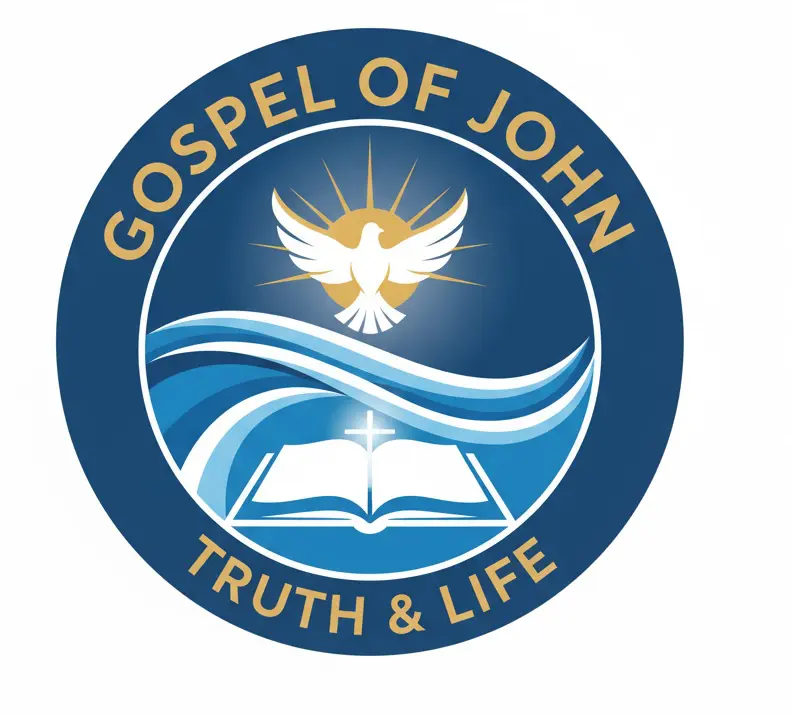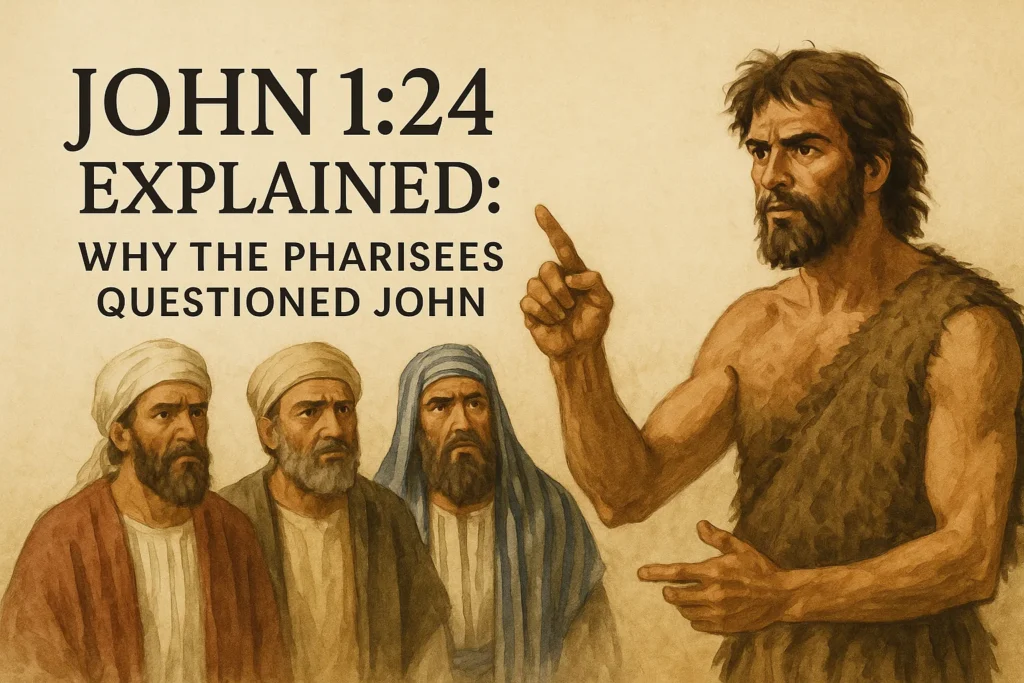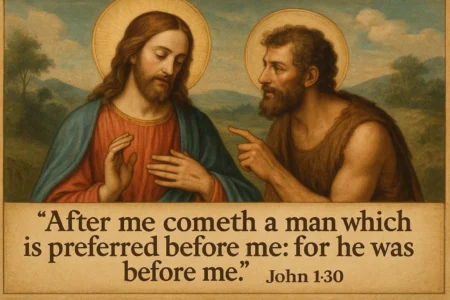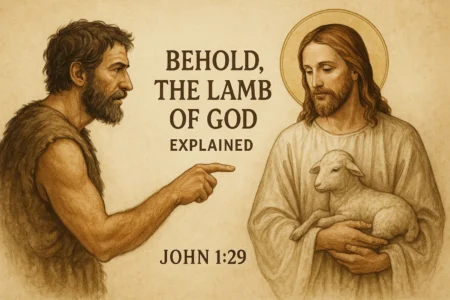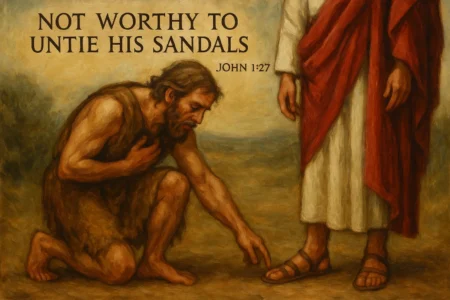The air by the Jordan River is thick with tension. It’s electric. Crowds are flocking from Jerusalem, from all over Judea, drawn like magnets to the wilderness. They’re coming to see a man. Not a king in a palace, but a rough-hewn preacher dressed in camel’s hair, eating locusts and wild honey. This man, John the Baptist, is doing something radical. He’s calling the “chosen people” to repent and be baptized. And they are listening.
This kind of popular movement doesn’t go unnoticed. The religious authorities in Jerusalem, the guardians of Jewish law and tradition, hear the rumbles. They send a delegation. This isn’t a friendly visit; it’s an investigation. John’s gospel tells us the first group, priests and Levites, grills John on his identity. “Are you the Christ? Elijah? The Prophet?” John says no to all three.
Then we get to the verse that sparks our whole discussion, John 1:24. It’s a seemingly simple parenthetical note: “(Now they who were sent were from the Pharisees.)” This verse is the pivot. It explains who was really behind the next, more pointed question. This article is your deep-dive John 1:24 explained—a look at why this specific group had a unique and urgent problem with what John was doing. This wasn’t just curiosity; it was a challenge to their authority and their entire worldview.
More in John Chapter 1 Category
Key Takeaways
- John 1:24 is a pivot verse: It identifies the Pharisees as the group behind the real question: “Why are you baptizing?” This shifts the interrogation from who John is to what authority he has.
- The Pharisees were guardians of the Law: They weren’t just “bad guys.” They were deeply devout lay leaders who saw themselves as protecting Israel’s religious purity and traditions from error and chaos.
- Baptism was the problem: John’s baptism of Jews implied that being a descendant of Abraham wasn’t enough. It suggested the people were unclean and that the religious system the Pharisees upheld was failing.
- Authority was the core issue: In their minds, only a Messianic-level figure (the Christ, Elijah, or the Prophet) had the authority to institute a new, national ritual. John claimed to be none of them, yet he acted with that authority.
- John’s answer was a bypass: By quoting Isaiah and calling himself “the voice,” John claimed a direct divine commission, completely bypassing the Pharisees’ established religious structure.
Who Were These Men “Sent from the Pharisees”?
First, we need to get one thing straight. It’s easy to read the Gospels and paint the Pharisees with a single, broad brush: “the bad guys.” But the reality is far more complex and, frankly, more human. If we don’t understand who they were, we can’t understand why their questions in John 1 mattered so much.
The Pharisees weren’t priests who served in the Temple. They were, for the most part, laymen. Think of them as the deeply devout, highly educated, and fiercely committed guardians of Jewish life and law. They were the theological experts, the popular scholars of the day. Their entire mission, as they saw it, was to help the average person live out God’s law (both the written Torah and the oral traditions passed down) in everyday life. They believed this rigorous devotion was the key to Israel’s survival and future restoration.
I remember when I was elected president of a small community club. Suddenly, I wasn’t just a member; I was responsible for the budget, the bylaws, the traditions. I found myself becoming fiercely protective of “the way we do things,” not because I was a bad guy, but because I felt a heavy responsibility to keep the organization healthy and true to its purpose.
That’s a small taste of what the Pharisees felt. They were the self-appointed protectors of Israel’s soul. So, when they see a wild-eyed man in the desert drawing stadium-sized crowds and performing a ritual they hadn’t sanctioned, it’s not just a theological curiosity. It’s a five-alarm fire.
So, What Was So Threatening About This Wilderness Preacher?
John the Baptist was a problem for the Pharisees on multiple levels. He was operating completely outside their system. He wasn’t a graduate of their rabbinical schools. He wasn’t teaching in their synagogues. He was a rogue agent, a spiritual maverick. And he was incredibly popular.
This popularity was a direct challenge to their influence. They were the established teachers; why were people abandoning their local synagogues to go sit in the mud by the river? He was, in effect, pulling the rug out from under their authority.
But the real threat wasn’t his location or his wardrobe. It was his message. He was preaching “a baptism of repentance for the forgiveness of sins.” This sounds good to us, but to a Pharisee, it was deeply subversive. Baptism (a full-body immersion) was something they primarily associated with Gentiles—non-Jews—who wanted to convert to Judaism. It was a ritual to wash away pagan defilement.
John was taking this ritual and applying it to Jews.
His message was, essentially, “Your heritage as children of Abraham isn’t enough. Your adherence to the Law, as the Pharisees teach it, isn’t enough. You are spiritually unclean, and you need to repent and be washed, just like a Gentile.”
This was a profound insult. It implied the entire system they had dedicated their lives to was insufficient. He was telling the “insiders” that they were, in fact, “outsiders.” This was not a man making friends in high places.
Did They Genuinely Think John Might Be the Messiah?
Before we get to verse 24, the first delegation (priests and Levites, likely sent by the Pharisees and other council members) asks him a series of questions: “Who are you?”
They give him a multiple-choice test.
- Are you the Christ (the Messiah)?
- Are you Elijah?
- Are you the Prophet?
These weren’t random guesses. This was a checklist of the great prophetic figures they were expecting to appear at the end of days. The “Christ” was the long-awaited anointed King. “Elijah” was expected to return to “turn the hearts of the fathers to their children” before the great day of the Lord (Malachi 4:5). “The Prophet” was the one like Moses, promised in Deuteronomy 18:15.
The Pharisees were theological gatekeepers. They had a box, and they needed to know if John fit in it. John’s answer is blunt. “I am not.” He refuses every label they offer.
This is where the men from the Pharisees, mentioned in John 1:24, step in. They heard his denials. He’s not the Christ. He’s not Elijah. He’s not the Prophet. For them, this didn’t end the interrogation. It started the real one.
John 1:24 Explained: If You’re a “Nobody,” Why Are You Baptizing?
This is the central question. This is the John 1:24 explained moment. After John denies all their titles, verse 25 hits: “They asked him, ‘Why then are you baptizing, if you are not the Christ, nor Elijah, nor the Prophet?'”
Do you see the logic? It’s a brilliant legal cross-examination. What they were really saying is, “Okay, John, we’ve established who you are not. You are not any of the prophesied figures who, in our understanding, would have the divine authority to institute a new, national ordinance like this. You are, by your own admission, a ‘nobody’ on the prophetic checklist. So who gave you the right? By what authority are you doing this?”
In their worldview, authority was everything. It was hierarchical. It was passed down from teacher to student. It was based on credentials and tradition. You couldn’t just decide to be a spiritual leader and start a new ritual. That was chaos. That was how cults started. That was how you got the nation in trouble with God… and with Rome.
This question—”Why are you baptizing?”—was a demand for his credentials. “Show us your license. Show us the signature from a recognized authority.”
What Did “A Voice Crying in the Wilderness” Mean to Them?
John’s answer is spectacular. He doesn’t give them a credential they can recognize. He doesn’t cite a famous rabbi. He bypasses their entire system.
He says, “I am the voice of one crying in the wilderness, ‘Make straight the way of the Lord,’ as the prophet Isaiah said” (John 1:23).
He doesn’t claim to be a great person (Messiah, Elijah). He claims to be a function. He is a “voice.” And this voice isn’t authorized by the council in Jerusalem. This voice was commissioned 700 years earlier by the prophet Isaiah (Isaiah 40:3). He is, in essence, claiming a direct, divine commission from God Himself.
This was worse than claiming to be Elijah. This was claiming to be the personal herald of God’s own arrival. He was telling the guardians of the Law that God was doing something new, something outside their control, and that they weren’t the gatekeepers—he was.
I once worked for a large corporation. Everything had to go through channels, committees, and approval processes. I had an idea for a project that I knew would work, but it cut across three different departments. I went straight to a senior VP I had a good relationship with and got his verbal “go-ahead.” When I started, the managers of those departments were furious. “Who gave you the right?” they demanded. I had bypassed the entire structure. I didn’t have their “authority,” but I had an authority.
That’s exactly what John was doing. He was telling the Pharisees, “My authority doesn’t come from your committee. It comes directly from the King.”
Was This Just a Theological Spat or Something More?
This confrontation was about more than just hurt feelings or theological hair-splitting. It was about power, control, and national security. The Pharisees’ concern wasn’t just for Israel’s “soul” but for its “body” as well.
Judea was occupied territory. The Romans were in charge, and they had zero tolerance for popular Jewish movements, especially ones that had a “messianic” flavor. A “messiah,” in Roman ears, sounded like a “rebel king.” Any large-scale public disturbance could be interpreted as an insurrection, and the Roman response was always swift, brutal, and collective. A Roman legion would march in, and thousands would be crucified.
The Pharisees saw themselves as the buffer. They had to manage the religious expectations of the people while not provoking their Roman overlords. For more on this delicate balance, you can find excellent resources on the political and religious climate of Second Temple Judaism.
A rogue preacher like John, with no “off” switch, gathering thousands of people in the wilderness, talking about a new kingdom and a coming “Lord”… this was politically explosive. The Pharisees weren’t just thinking, “This man is a heretic.” They were thinking, “This man is going to get us all killed.”
Their interrogation was an attempt to get him on the record. To classify him. To control him. They were trying to put the fire out before it burned down the whole house.
How Did John’s Final Answer Seal the Confrontation?
John’s final answer is the master stroke. The Pharisees ask, “Why are you baptizing?” They are demanding he justify his own authority.
He responds (verses 26-27): “I baptize with water, but among you stands one you do not know, even he who comes after me, the strap of whose sandal I am not worthy to untie.”
He doesn’t justify himself at all. He deflects.
He essentially says, “You think my baptism is the issue? You’re focused on the wrong thing. My baptism is just with water. It’s preparatory. The reason I am here, the authority I have, is only because He is here. There is someone already standing among you—the real one, the one I’m not even worthy to serve as a slave for. He is the reason.”
John’s authority was not his own. It was borrowed from the one who was coming. He was only the opening act. The headliner was already in the building.
This was the ultimate non-answer to their question. He didn’t just bypass their authority structure; he rendered it irrelevant. He pointed to a new, supreme authority that made their credentials and committees meaningless. The King was here, and the herald’s only job was to shout.
Why Does This 2,000-Year-Old Question Still Matter?
This encounter at the Jordan River isn’t just an ancient historical footnote. The tension in this scene echoes through our own lives every single day. The questions asked of John are the same questions the world, and sometimes our own internal doubts, ask of faith, conviction, and new callings.
This story forces us to grapple with profound, modern questions:
- Where does true spiritual authority come from? Does it come from an institution, a degree, a title, and a tradition? Or does it come from a direct, personal encounter with God?
- How do we respond to the “new thing”? When God does something outside our comfortable structures, outside our denominations or traditions, do we react like the Pharisees? Do we try to shut it down, control it, and demand its credentials? Or do we have the humility to watch and listen?
- Are we willing to be a “voice”? John’s power came from his willingness to be nothing but a voice for someone else. He wasn’t building his own brand or platform. His entire identity was wrapped up in pointing to Jesus.
This is the challenge of John 1:24. It’s a challenge to every established system, religious or otherwise.
The Echo of the Pharisees’ Question
So, when we read, “(Now they who were sent were from the Pharisees,)” we know exactly why the next question was asked. The Pharisees’ question—”Why then are you baptizing?”—was the logical, necessary, and desperate question of an establishment that felt its control slipping. It was a question from men who genuinely believed they were protecting their nation from chaos.
They were men of the law. They needed a “why” that fit into their legal, traditional framework.
John was a man of the spirit. His “why” was not a precedent, but a person.
The tension between these two worldviews is the engine that drives so much of the Gospels. And it’s a tension that still exists today. We are constantly caught between the comfort of the “way things have always been done” and the wild, untamable call of a “voice crying in the wilderness.”
John’s story, and the Pharisees’ interrogation, forces us to ask ourselves: Which one are we listening to?
FAQ
Who were the men ‘sent from the Pharisees’ mentioned in John 1:24, and what was their role in the story?
The men sent from the Pharisees were likely priests and Levites, who were lay religious leaders, deeply committed to maintaining Jewish law and tradition, and acting as guardians of Israel’s spiritual purity.
Why did the Pharisees challenge John the Baptist about his baptism, and what was their main concern?
The Pharisees challenged John because his baptism implied that adherence to the Law and Jewish heritage alone was insufficient, which threatened their authority, and because his practice of baptizing Jews without their approval questioned the religious system they upheld.
What did John mean by saying he was ‘the voice of one crying in the wilderness,’ and what was the significance of this claim?
By identifying as ‘the voice of one crying in the wilderness,’ John was asserting that his authority came directly from divine Scripture, specifically Isaiah, and was not dependent on human institutions or traditions, thus bypassing the Pharisees’ authority structures.
